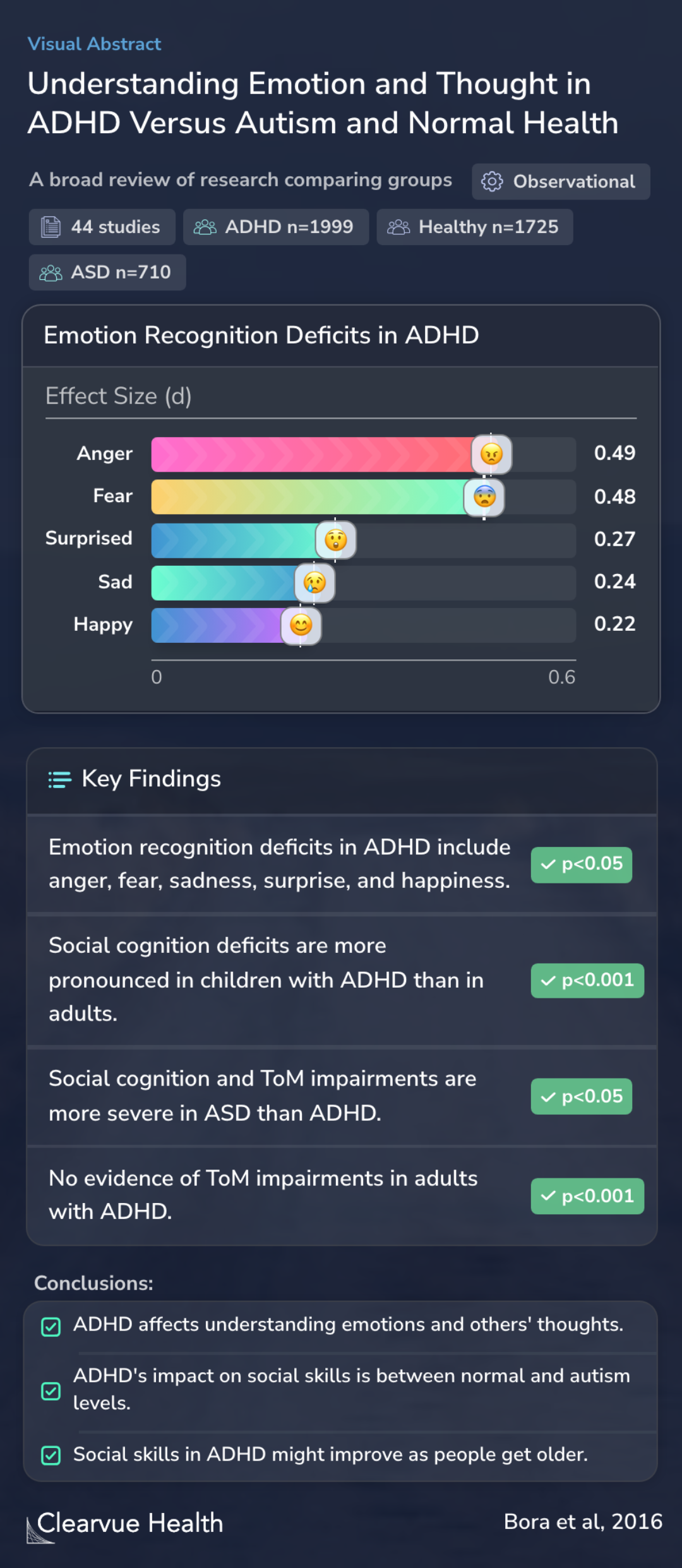Meta-analysis of social cognition in attention-deficit/hyperactivity disorder (ADHD): comparison with healthy controls and autistic spectrum disorder
Understanding Emotion and Thought in ADHD Versus Autism and Normal Health
Bora E, Pantelis C

Objectives
The paper sets out to explore how conditions like ADHD (Attention-Deficit/Hyperactivity Disorder) and ASD (Autism Spectrum Disorder) can make it harder for people to understand and think about what others are feeling or thinking. This ability, known as Theory of Mind (ToM), helps us figure out things like why jokes are funny or what someone means when they're being sarcastic. The paper specifically looks into how people with ADHD and ASD might struggle with this, comparing their experiences with those who don't have these conditions.
Impairment in social cognition is an established finding in autism spectrum disorders (ASD). Emerging evidence suggests that attention-deficit/hyperactivity disorder (ADHD) might be also associated with deficits in theory of mind (ToM) and emotion recognition. However, there are inconsis...
Methods
In their investigation, the authors carried out a detailed analysis, called a meta-analysis, to compare studies on social cognition—which includes understanding emotions and Theory of Mind—between individuals with ADHD, those with ASD, and healthy people without these conditions. They reviewed a substantial number of studies, 44 in total, that looked at almost 2000 people with ADHD and compared them with both healthy individuals and those with ASD to understand the differences and similarities in social cognition.
We conducted a meta-analysis of social cognition, including emotion recognition and ToM, studies in ADHD compared with healthy controls and ASD. The current meta-analysis involved 44 studies comparing ADHD (n = 1999) with healthy controls (n = 1725) and 17 studies comparing ADHD (n = 772...
Results
The findings of the paper reveal that people with ADHD have significant challenges when it comes to recognizing emotions like anger, fear, sadness, surprise, and happiness. These challenges were measured and shown to have specific effect sizes, which quantifies the difference between the two groups. For instance, the difficulty in recognizing anger had an effect size of 0.49, indicating a moderate difference compared to healthy controls.
It was also found that while kids with ADHD showed more noticeable issues with social cognition, these problems were less apparent in adults. Comparatively, individuals with ASD faced more severe challenges in these areas than those with ADHD. However, there was no solid evidence to suggest that adults with ADHD continue to have Theory of Mind impairments.
Facial and vocal emotion recognition (d = 0.40-0.44) and ToM (d = 0.43) abilities were significantly impaired in ADHD. The most robust facial emotion recognition deficits were evident in anger and fear. Social cognitive deficits were either very subtle (emotion recognition) or non-signif...
Conclusions
The study concludes that individuals with ADHD fall somewhere between ASD and healthy controls in terms of social cognition performance. This suggests that while people with ADHD do face challenges in understanding emotions and the thoughts of others, these difficulties might not be as severe as those experienced by individuals with ASD. Moreover, there's an interesting hint that as people with ADHD grow older, they might get better at these social skills. This improvement with age highlights the possibility that social cognition in ADHD might evolve differently from ASD, where such deficits could persist.
Performance of individuals with ADHD on social cognition lies intermediate between ASD and healthy controls. However, developmental trajectories of social cognition probably differ between ADHD and ASD as social cognitive deficits in ADHD might be improving with age in most individuals. ...
Key Takeaways
Context
Other research also sheds light on the social challenges faced by individuals with ADHD and how they might overlap with those experienced by people with autism. For instance, a study by Smalley et al. in 2009 delved into how ADHD is linked to difficulties in social interactions, which could also relate to autism risk factors. This connection suggests that ADHD isn't just about being hyperactive or having trouble paying attention; it can also involve complex social challenges, some of which might resemble those seen in autism.
Moreover, the question of how to best support social skills development in children with ADHD remains. A study by Abikoff et al. 2004 investigated whether combining ADHD medication with social skills training could help improve children's ability to make friends. Surprisingly, they found that just medication might be enough to aid in the development of social skills without additional training. This finding is crucial as it suggests that effective management of ADHD symptoms could potentially alleviate some of the social challenges associated with the condition.